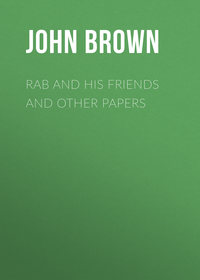Kitap dosya olarak indirilemez ancak uygulamamız üzerinden veya online olarak web sitemizden okunabilir.
Kitabı oku: «Rab and His Friends and Other Papers», sayfa 23
HENRY HALLAM
"Dr. Brown, Edinburgh."
The following extracts, from the Memoir of Henry Fitzmaurice Hallam mentioned above, which has been appended to a reprint of his brother's Remains (for private circulation), form a fitting close to this memorial of these two brothers, who were "lovely and pleasant in their lives," and are now by their deaths not divided: —
"But few months have elapsed since the pages of In Memoriam recalled to the minds of many, and impressed on the hearts of all who perused them, the melancholy circumstances attending the sudden and early death of Arthur Henry Hallam, Esq. Not many weeks ago the public journals contained a short paragraph announcing the decease, under circumstances equally distressing, and in some points remarkably similar, of Henry Fitzmaurice, Mr. Hallam's younger and only remaining son. No one of the very many who appreciate the sterling value of Mr. Hallam's literary labours, and who feel a consequent interest in the character of those who would have sustained the eminence of an honourable name; no one who was affected by the striking and tragic fatality of two such successive bereavements, will deem an apology needed for this short and imperfect Memoir.
"Henry Fitzmaurice Hallam, the younger son of Henry Hallam, Esq., was born on the 31st of August, 1824; he took his second name from his godfather, the Marquis of Lansdowne… A habit of reserve, which characterized him at all periods of life, but which was compensated in the eyes of even his first companions by a singular sweetness of temper, was produced and fostered by the serious thoughtfulness ensuing upon early familiarity with domestic sorrow.
"'He was gentle,' writes one of his earliest and closest school-friends, 'retiring, thoughtful to pensiveness, affectionate, without envy or jealousy, almost without emulation, impressible, but not wanting in moral firmness. No one was ever more formed for friendship. In all his words and acts he was simple, straightforward, true. He was very religious. Religion had a real effect upon his character, and made him tranquil about great things, though he was so nervous about little things.'
"He was called to the bar in Trinity Term, 1850, and became a member of the Midland Circuit in the summer. Immediately afterwards he joined his family in a tour on the Continent. They had spent the early part of the autumn at Rome, and were returning northwards, when he was attacked by a sudden and severe illness, affecting the vital powers, and accompanied by enfeebled circulation and general prostration of strength. He was able, with difficulty, to reach Sienna, where he sank rapidly through exhaustion, and expired on Friday, October 25. It is to be hoped that he did not experience any great or active suffering. He was conscious nearly to the last, and met his early death (of which his presentiments, for several years, had been frequent and very singular) with calmness and fortitude. There is reason to apprehend, from medical examination, that his life would not have been of very long duration, even had this unhappy illness not occurred. But for some years past his health had been apparently much improved; and, secured as it seemed to be by his unintermitted temperance, and by a carefulness in regimen which his early feebleness of constitution had rendered habitual, those to whom he was nearest and dearest had, in great measure, ceased to regard him with anxiety. His remains were brought to England, and he was interred, on December 23d, in Clevedon Church, Somersetshire, by the side of his brother, his sister, and his mother.
"For continuous and sustained thought he had an extraordinary capacity, the bias of his mind being decidedly towards analytical processes; a characteristic which was illustrated at Cambridge by his uniform partiality for analysis, and comparative distaste for the geometrical method, in his mathematical studies. His early proneness to dwell upon the more recondite departments of each science and branch of inquiry has been alluded to above. It is not to be inferred that, as a consequence of this tendency, he blinded himself, at any period of his life, to the necessity and the duty of practical exertion. He was always eager to act as well as speculate; and, in this respect, his character preserved an unbroken consistency and harmony from the epoch when, on commencing his residence at Cambridge, he voluntarily became a teacher in a parish Sunday-school, for the sake of applying his theories of religious education, to the time when, on the point of setting forth on his last fatal journey, he framed a plan of obtaining access, in the ensuing winter, to a large commercial establishment, in the view of familiarizing himself with the actual course and minute detail of mercantile transactions.
"Insensibly and unconsciously he had made himself a large number of friends in the last few years of his life: the painful impression created by his death in the circle in which he habitually moved, and even beyond it, was exceedingly remarkable, both for its depth and extent. For those united with him in a companionship more than ordinarily close, his friendship had taken such a character as to have almost become a necessity of existence. But it was upon his family that he lavished all the wealth of his disposition – affection without stint, gentleness never once at fault, considerateness reaching to self-sacrifice: —
"Di ciô si biasmi il debolo intelletto
E'l parlar nostro, che non ha vulore
Di ritrar tutto ciô che dice amore.
